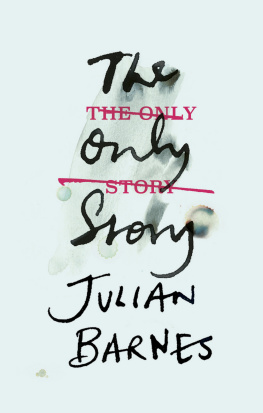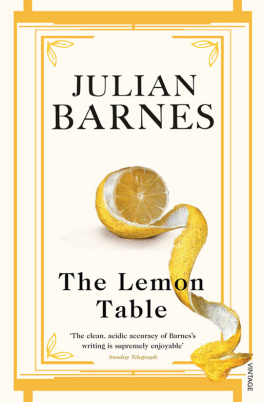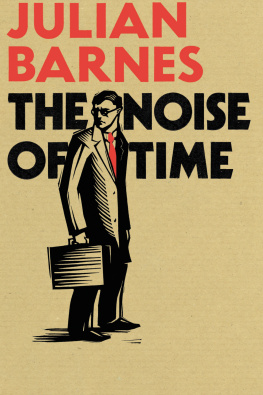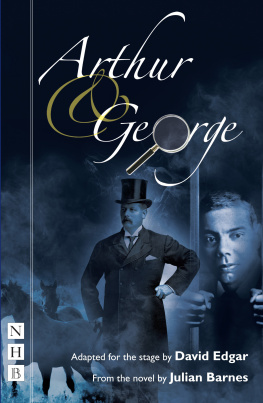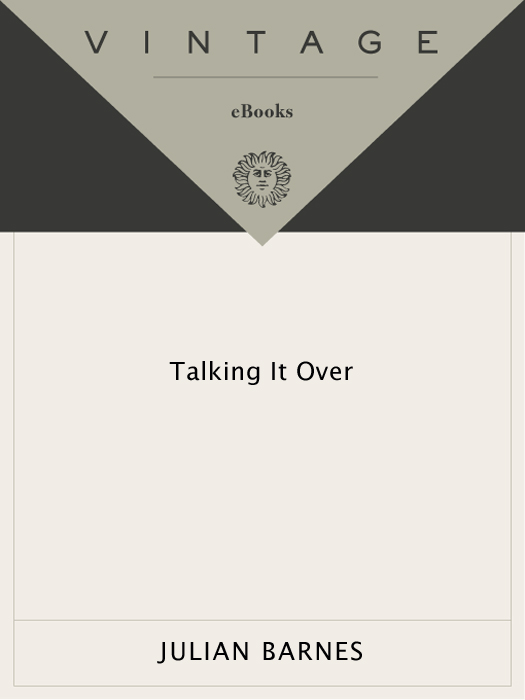Praise for Julian Barness
Talking It Over
The funniest, cleverest book Ive read in years Talking It Over isnt just a boffo modern novel of manners. Barnes got me seriously involved with his comic characters. Ill remember them with great affection.
Edward Hower, Chicago Tribune
Barnes has created vivid, idiosyncratic voices. The book is beautifully constructed, with the narrators memories overlapping just so, telling stories that sometimes differ widely and sometimes oh-so-subtly. Barnes writes like a dream.
Village Voice Literary Supplement
Talking It Over is rich and fully realized. Mr. Barnes spins a story of intrigue and dazzlement.
Kingston Whig-Standard Magazine
What is impossible to suggest is Barness almost magical skill in making his three-part counterpoint work so well. Each character alters as it revolves and alters back, sometimes with hilarious sharpness.
Los Angeles Times Book Review
I was drawn irresistibly into the story. Barnes brings to bear all the powers of a scrupulous intelligence. He pushes reason all the way past its breaking point, the point where it gives way not just to unreason but to pathos.
Stephen Goodwin, USA Today
Barnes proves himself once again to be a master of wit and playful technique.
Vogue
packed full of funny and incongruous observations on contemporary life.
Vancouver Sun
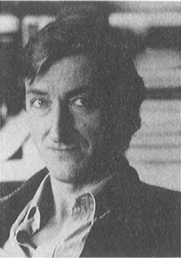
Julian Barnes
Talking It Over
Julian Barnes was born in Leicester, England, in 1946, was educated at Oxford University, and now lives in London. His five previous novelsMetroland, Before She Met Me, Flauberts Parrot, Staring at the Sun, and A History of the World in 10 Chaptershave brought him international acclaim. His newest novel, The Porcupine, has just been published.

ALSO BY Julian Barnes
Metroland
Before She Met Me
Flauberts Parrot
Staring at the Sun
A History of the World in 10 Chapters
The Porcupine
FIRST VINTAGE INTERNATIONAL EDITION, NOVEMBER 1995
Copyright 1991 by Julian Barnes
All rights reserved under International and Pan-American Copyright Conventions. Published in the United States by Vintage Books, a division of Random House, Inc., New York. Originally published in Great Britain by Jonathan Cape Limited, London, in 1991. First published in the United States by Alfred A. Knopf, Inc., New York, in 1991.
Grateful acknowledgment is made to Acuff-Rose Music, Inc., for permission to reprint excerpts from Three Cigarettes in an Ash Tray by Eddie Miller and W.S. Stevenson, copyright 1982 by Acuff-Rose Music, Inc., and excerpts from Walkin After Midnight by Alan Block and Don Hecht, copyright 1956, copyright renewed 1984 by Acuff-Rose Music, Inc. All rights reserved. International copyright secured. Used by permission.
eISBN: 978-0-307-79788-9
v3.1
to Pat
He lies like an eye-witness.
RUSSIAN SAYING
Contents
1: His, His or Her, Their
Stuart My name is Stuart, and I remember everything.
Stuarts my Christian name. My full name is Stuart Hughes. My full name: thats all there is to it. No middle name. Hughes was the name of my parents, who were married for twenty-five years. They called me Stuart. I didnt particularly like the name at first I got called things like Stew and Stew-Pot at school but Ive got used to it. I can handle it. I can handle my handle.
Sorry, Im not very good at jokes. People have told me that before. Anyway, Stuart Hughes I think thatll do for me. I dont want to be called St John St John de Vere Knatchbull. My parents were called Hughes. They died, and now Ive got their name. And when I die, Ill still be called Stuart Hughes. There arent too many certainties in this great big world of ours, but thats one of them.
Do you see the point Im making? Sorry, absolutely no reason why you should. Ive only just started. You scarcely know me. Lets start again. Hullo, Im Stuart Hughes, nice to meet you. Shall we shake hands? Right, good. No, the point Im trying to make is this: everyone else around here has changed their name. Thats quite a thought. Its even a bit creepy.
Now, did you notice how I said everyone followed by their? Everyone has changed their name. I did it deliberately, probably just to annoy Oliver. We had this tremendous row with Oliver. Well, an argument, anyway. Or at least a disagreement. Hes a great pedant, Oliver. Hes my oldest friend, so Im allowed to call him a great pedant. Soon after Gill met him thats my wife, Gillian she said to me, You know, your friend talks like a dictionary.
We were on a beach just up from Frinton at the time, and when Oliver heard Gills remark he went into one of his spiels. He calls them riffs, but thats not my sort of word. I cant reproduce the way he talks youll have to listen to him for yourself but he just sort of zooms off. Thats what he did then. What kind of dictionary am I? Do I have a thumb index? Am I bilingual? And so on. He went on like this for a while, and ended up asking who was going to buy him. What if nobody wants me? Disregarded. Dust on my top fore-edge. Oh no, Im going to be remaindered, I can see it, Im going to be remaindered. And he started thumping the sand and wailing at the seagulls real Play for Today stuff and an elderly couple who were listening to a radio behind a wind-break looked quite alarmed. Gillian just laughed.
Anyway, Olivers a pedant. I dont know what you think about everyone followed by their. Probably not very much, no reason why you should. And I cant remember how it first came up, but we had this argument. Oliver and Gillian and me. We each had a different opinion. Let me try and set down the opposing points of view. Perhaps Ill do the minutes of the meeting, like at the bank.
OLIVER said that words like everyone and someone and no-one are singular pronouns and must therefore be followed by the singular possessive pronoun, namely his.
GILLIAN said you couldnt make a general remark and then exclude half the human race, because fifty per cent of the time that someone will turn out to be female. So for reasons of logic and fairness you ought to say his or her.
OLIVER said we were discussing grammar not sexual politics.
GILLIAN said how could we separate the two, because where did grammar come from if not from grammarians, and almost all grammarians probably every single one of them for all she knew were men, so what did we expect; but mainly she was talking common sense.
OLIVER rolled his eyes back, lit a cigarette and said that the very phrase common sense was a contradiction in terms, and if Man at which point he pretended to be extremely embarrassed and correct himself to Man-or-Woman if if Man-or-Woman had relied upon common sense over the previous millennia wed all still be living in mud huts and eating frightful food and listening to Del Shannon records.



